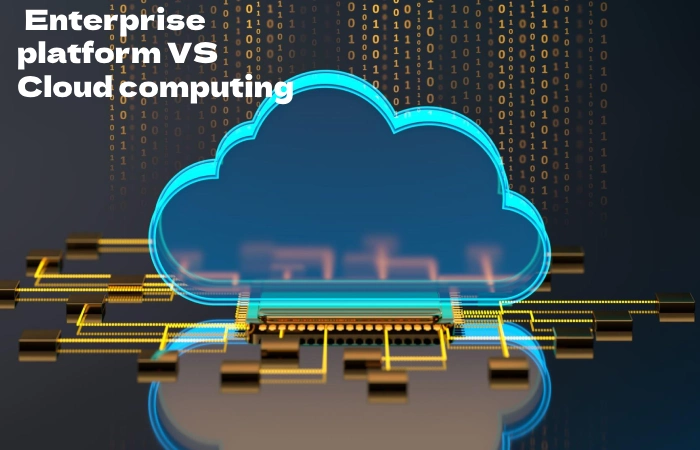In this article, we’ll learn about enterprise platforms and the cloud. There is a close relationship between enterprise platforms and the cloud. Many enterprise platforms are cloud-based, meaning their software and data are hosted on cloud infrastructure providers like AWS, Azure, or Google Cloud. This cloud-enabled approach provides scalability, reliability, continuous updates, and other advantages over traditional on-premise deployments.
Table of Contents
Cloud
 The cloud stores and accesses data and programs through the internet instead of a computer’s hard drive. The “cloud” symbolizes the internet in diagrams of computing systems. With cloud computing, users can access files, applications, and services from any device that is connected to the internet. All the processing power and data storage is done offsite by cloud computing providers like Amazon Web Services, Microsoft Azure, IBM, or Google Cloud. This allows users and organizations to access their data anywhere rather than relying on a single physical machine. The benefits of cloud computing consist of reduced IT costs, greater flexibility, scalability to handle more or fewer users, remote access, automatic software updates, and data backup protection. While the internet is required, users don’t have to manage physical servers or storage hardware. Cloud computing has transformed how we use technology and how companies deliver services.
The cloud stores and accesses data and programs through the internet instead of a computer’s hard drive. The “cloud” symbolizes the internet in diagrams of computing systems. With cloud computing, users can access files, applications, and services from any device that is connected to the internet. All the processing power and data storage is done offsite by cloud computing providers like Amazon Web Services, Microsoft Azure, IBM, or Google Cloud. This allows users and organizations to access their data anywhere rather than relying on a single physical machine. The benefits of cloud computing consist of reduced IT costs, greater flexibility, scalability to handle more or fewer users, remote access, automatic software updates, and data backup protection. While the internet is required, users don’t have to manage physical servers or storage hardware. Cloud computing has transformed how we use technology and how companies deliver services.
Enterprise Platform

An enterprise platform refers to the core software and technologies that power a large organization’s critical business functions and operations. Enterprise platforms typically include applications and platforms like ERP, CRM, HCM (human capital management), BI (business intelligence), collaboration tools, and middleware that connect these systems. These platforms traditionally run locally on a company’s on-premises data centers and private servers. They provide centralized databases and platforms for different departments to manage areas like supply chain, finance, manufacturing, sales, marketing, HR, and customer service. Enterprise platforms aim to integrate these functions on a shared technical architecture and data model to improve organizational communication, workflow management, data sharing, and analytics capabilities. They allow large enterprises to standardize processes and leverage economies of scale in their technical infrastructure and application portfolio. Overall, an enterprise platform forms the digital backbone that supports a company’s core operations and administrative activities.
Enterprise Platforms vs. Cloud Computing

Enterprise platforms and cloud computing both provide IT solutions for businesses. However, they differ in meaningful ways. Enterprise platforms refer to on-premises legacy systems like ERP, CRM, and database software traditionally installed and run locally on a company’s servers and infrastructure. In contrast, cloud computing delivers these types of applications and services over the internet, where software, infrastructure, and data are hosted in remote data centers managed by third-party providers like Amazon Web Services, Microsoft Azure, or Google Cloud. Cloud models provide scalability, flexibility, and lower upfront costs than maintaining expensive on-site data centers. However, some businesses still prefer enterprise platforms for security reasons or to keep sensitive data within their firewalls. Most companies now leverage a hybrid approach utilizing cloud and on-premises systems to balance control, costs, capabilities, and compliance.
Relationship Between Cloud And Enterprise Platforms
Enterprise platforms have increasingly integrated cloud-based services and deployment options over the last decade. Traditional on-premise enterprise software suites now offer the ability to run applications and workloads offsite in the cloud. This provides benefits like centralized infrastructure management, scalability without costly hardware investments, and easy global access for mobile workforces. Cloud-native enterprise platforms take this further by building applications directly in the cloud model, optimized for scalability, high availability, and elasticity. Whether running existing systems in the cloud or leveraging purpose-built cloud platforms, enterprises gain agility, redundancy, infrastructure savings, and the ability to innovate faster through cloud-enabled platforms. This blurring of boundaries between enterprise IT and cloud services has cemented cloud computing as a strategic partner to businesses at every level.
Conclusion
While enterprise platforms and cloud computing both provide significant IT capabilities for businesses, they differ in how and where the applications are hosted. Traditionally, enterprise platforms involved on-premise software running on local servers. However, the cloud now enables these same core business systems to be delivered as a service over the internet. While certain concerns around security and control still drive some organizations to maintain platforms on-premises, most companies now leverage a hybrid approach. They utilize the scalability, flexibility and lower costs of the cloud wherever possible, while keeping sensitive systems on-premises. Ultimately, as cloud technologies continue advancing to meet enterprise security and compliance needs, the relationship between these models will continue to converge. More platforms will be offered both as cloud services and on-premise software, giving IT leaders greater choice in designing optimal, hybrid solutions.
Related posts
Featured Posts
5 Common College Problems With Effective Solutions
College life can be as terrifying as it is exciting. That’s why many freshmen face a number of common problems…
Brain Test Level 83 – Answer, Explanation, and More
Brain Test Levels Brain tests are designed to engage different brain parts and challenge reasoning abilities. Higher levels tend to…




